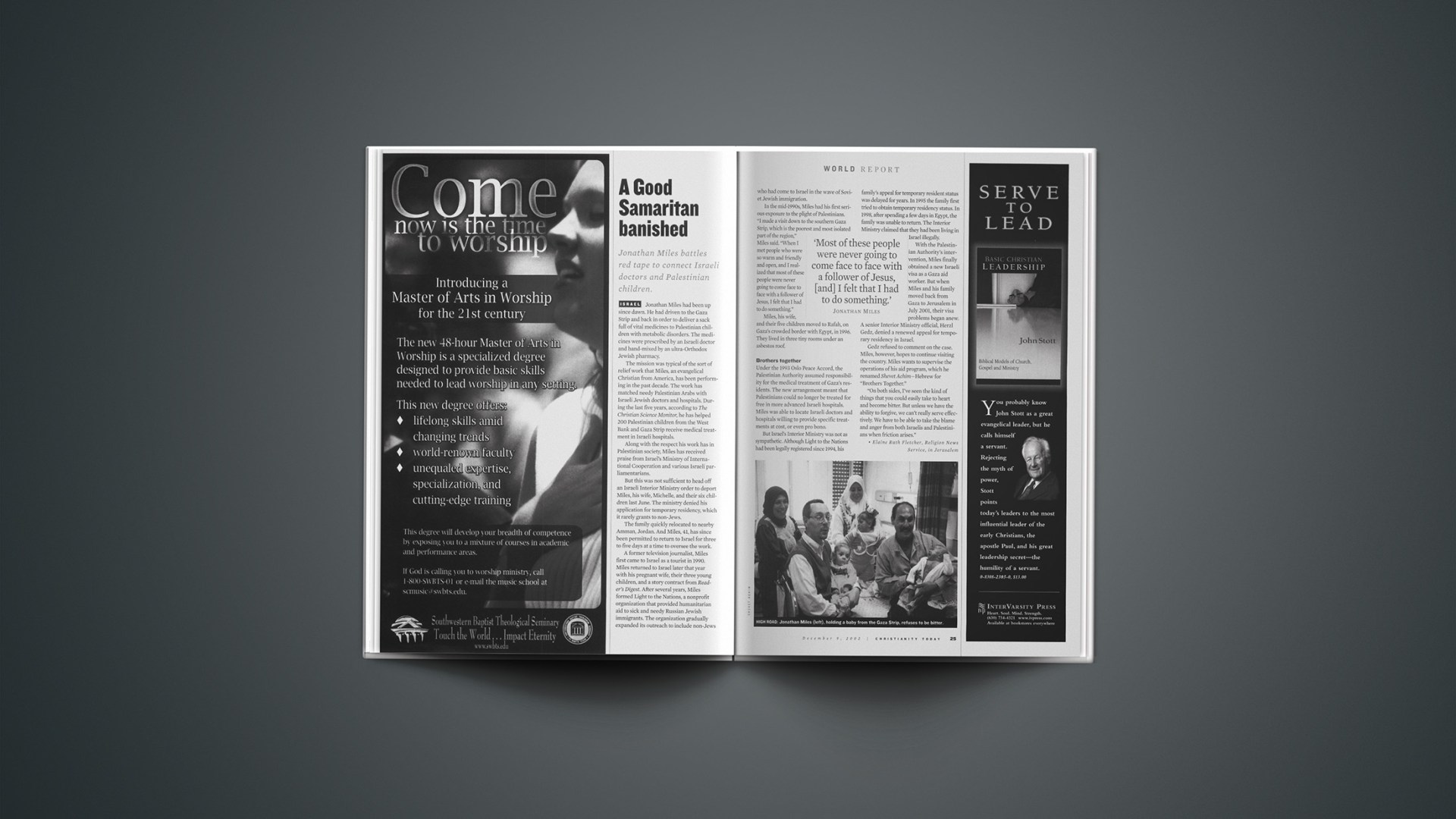Jonathan Miles had been up since dawn. He had driven to the Gaza Strip and back in order to deliver a sack full of vital medicines to Palestinian children with metabolic disorders. The medicines were prescribed by an Israeli doctor and hand-mixed by an ultra-Orthodox Jewish pharmacy.
The mission was typical of the sort of relief work that Miles, an evangelical Christian from America, has been performing in the past decade. The work has matched needy Palestinian Arabs with Israeli Jewish doctors and hospitals. During the last five years, according to The Christian Science Monitor, he has helped 200 Palestinian children from the West Bank and Gaza Strip receive medical treatment in Israeli hospitals.
Along with the respect his work has in Palestinian society, Miles has received praise from Israel’s Ministry of International Cooperation and various Israeli parliamentarians.
But this was not sufficient to head off an Israeli Interior Ministry order to deport Miles, his wife, Michelle, and their six children last June. The ministry denied his application for temporary residency, which it rarely grants to non-Jews.
The family quickly relocated to nearby Amman, Jordan. And Miles, 41, has since been permitted to return to Israel for three to five days at a time to oversee the work.
A former television journalist, Miles first came to Israel as a tourist in 1990. Miles returned to Israel later that year with his pregnant wife, their three young children, and a story contract from Reader’s Digest. After several years, Miles formed Light to the Nations, a nonprofit organization that provided humanitarian aid to sick and needy Russian Jewish immigrants. The organization gradually expanded its outreach to include non-Jews who had come to Israel in the wave of Soviet Jewish immigration.
In the mid-1990s, Miles had his first serious exposure to the plight of Palestinians.
“I made a visit down to the southern Gaza Strip, which is the poorest and most isolated part of the region,” Miles said. “When I met people who were so warm and friendly and open, and I realized that most of these people were never going to come face to face with a follower of Jesus, I felt that I had to do something.”
Miles, his wife, and their five children moved to Rafah, on Gaza’s crowded border with Egypt, in 1996. They lived in three tiny rooms under an asbestos roof.
Brothers together
Under the 1993 Oslo Peace Accord, the Palestinian Authority assumed responsibility for the medical treatment of Gaza’s residents. The new arrangement meant that Palestinians could no longer be treated for free in more advanced Israeli hospitals. Miles was able to locate Israeli doctors and hospitals willing to provide specific treatments at cost, or even pro bono.
But Israel’s Interior Ministry was not as sympathetic. Although Light to the Nations had been legally registered since 1994, his family’s appeal for temporary resident status was delayed for years. In 1995 the family first tried to obtain temporary residency status. In 1998, after spending a few days in Egypt, the family was unable to return. The Interior Ministry claimed that they had been living in Israel illegally.
With the Palestinian Authority’s intervention, Miles finally obtained a new Israeli visa as a Gaza aid worker. But when Miles and his family moved back from Gaza to Jerusalem in July 2001, their visa problems began anew. A senior Interior Ministry official, Herzl Gedz, denied a renewed appeal for temporary residency in Israel.
Gedz refused to comment on the case. Miles, however, hopes to continue visiting the country. Miles wants to supervise the operations of his aid program, which he renamed Shevet Achim—Hebrew for “Brothers Together.”
“On both sides, I’ve seen the kind of things that you could easily take to heart and become bitter. But unless we have the ability to forgive, we can’t really serve effectively. We have to be able to take the blame and anger from both Israelis and Palestinians when friction arises.”
Copyright © 2002 Christianity Today. Click for reprint information.
Related Elsewhere
Previous coverage of this story includes:
A Christian ‘Samaritan’ with Israeli visa trouble—The Christian Science Monitor (August 22, 2002)
Israel Deports American Christian Who Helped Sick Palestinian Children—Christianity Today (July 2, 2002)
American who arranged care for Palestinian infants refused reentry—The Jerusalem Post (June 15, 2002)
Shevet Achim’s website hasn’t been updated for a while, so it has no news about Miles’s deportation. Embrace Israel Ministries, however, has updates from Miles, including an item about his deporation.
CBN News profiled Shevet Achim’s work last May.










